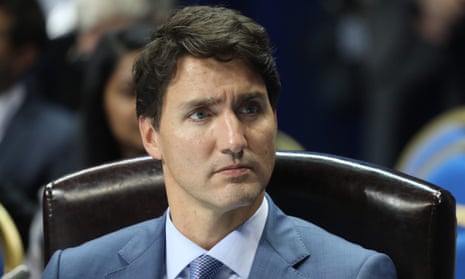Canadian prime minister Justin Trudeau violated the country’s ethics laws when he urged his attorney general not to prosecute an engineering company in a conflict of interest case, a watchdog ruled on Wednesday.
According to a bombshell report by Canada’s ethics commissioner, Trudeau engaged in “flagrant attempts to influence” his attorney general and minister of justice, Jody Wilson-Raybould.
The ruling marks a major blow to Trudeau’s governing Liberal party less than 10 weeks before a general election.
Trudeau and his aides are accused of pressuring Wilson-Raybould to abandon prosecution of Montreal-based construction giant SNC-Lavalin.
In the report, independent ethics commissioner Mario Dion said Trudeau and his officials attempted to circumvent, undermine and discredit a decision by federal prosecutors that the firm should face trial on corruption charges.
While senior prosecutors sought criminal charges against the company for fraud and bribery in Libya from 2001 to 2011, Trudeau and his team instead lobbied for the deferred prosecution agreement, in essence allowing SNC-Lavalin to pay a fine in lieu of a criminal prosecution, with no ban on bidding for lucrative federal contracts. After Wilson‑Raybould refused to overrule the prosecutor’s decision, she was shuffled out of her roles as attorney general and minister of justice.
The prime minister has consistently denied any wrongdoing in the affair. Trudeau, who said he was worried about potential job losses should the trial go ahead, admitted he tried to persuade Wilson-Raybould last year to reconsider the decision but insisted he did nothing wrong.
Dion disagreed, saying Trudeau had contravened conflict of interest rules forbidding public office holders from trying to improperly further another person’s private interests.
“The evidence showed there were many ways in which Mr Trudeau, either directly or through the actions of those under his direction, sought to influence the attorney general,” Dion wrote.
“Because SNC-Lavalin overwhelmingly stood to benefit from Ms Wilson-Raybould’s intervention, I have no doubt that the result of Mr Trudeau’s influence would have furthered SNC-Lavalin’s interests. The actions that sought to further these interests were improper,” he said in his decision.
“The prime minister, directly and through his senior officials, used various means to exert influence over Ms Wilson‑Raybould. The authority of the prime minister and his office was used to circumvent, undermine and ultimately attempt to discredit the decision of the director of public prosecutions as well as the authority of Ms Wilson‑Raybould as the crown’s chief law officer,” Dion said.
In addition to a fall in the polls for Trudeau, there were several other political casualties of the scandal. Trudeau lost his closest adviser, Gerald Butts, and expelled Wilson-Raybould and Jane Philpott from the Liberal caucus for their vocal criticism of his handling of the case. Canada’s top civil servant, former privy council clerk Michael Wernick, also resigned.
In his report, Dion determined discussions between Trudeau and Wernick over the political fallout of SNC-Lavalin’s prosecution were “improper”.
Dion concluded that Trudeau, in his lobbying of Wilson-Raybould, breached a doctrine aiming to discourage improper political interference of the attorney general by the executive.
It is not the first time Trudeau has run afoul of the country’s conflict of interest laws. In 2017, then ethics commissioner Mary Dawson found that the prime minister violated the law a year earlier when he took two all-expenses-paid family trips, including a helicopter ride, to a private residence in the Bahamas owned by the Aga Khan. Trudeau has consistently denied any wrongdoing.
The scandal, which has been politically costly for the governing Liberals, had largely faded from view in recent months. But Dion’s findings are likely to reinvigorate criticism of Trudeau by his political rivals.
Charlie Angus, a member of the leftwing New Democratic party, who joined initial calls for an ethics investigation, called Dion’s report “disturbing” and Trudeau’s actions “unacceptable”.
To blunt Dion’s findings, Trudeau is expected to release a report by former Liberal cabinet member Anne McLellan on the SNC-Lavalin affair, which the prime minister described earlier as “great”.
But Dion’s findings, released two months before the federal election, are likely to reinvigorate criticism of Trudeau by other party leaders.
“This is a bombshell report,” said Jagmeet Singh, the leader of the leftwing New Democratic party, adding that Trudeau’s actions were outrageous and unacceptable.
The Conservative party leader, Andrew Scheer, who is jockeying with Trudeau as frontrunner in the polls, described his actions as “unforgivable”.
“He has used the power of his office to enrich himself, to reward himself and to punish his critics,” said Scheer.
